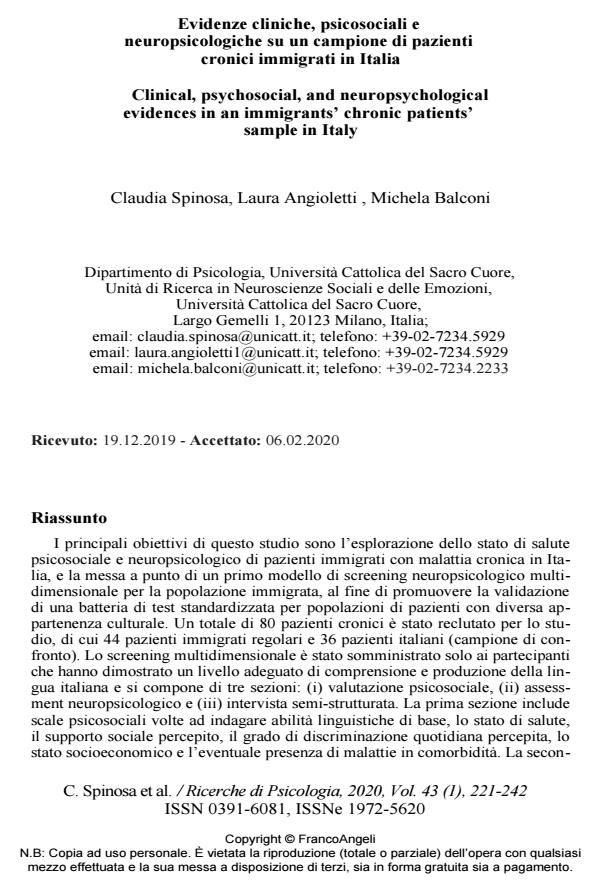Evidenze cliniche, psicosociali e neuropsicologiche su un campione di pazienti cronici immigrati in Italia
Titolo Rivista RICERCHE DI PSICOLOGIA
Autori/Curatori Claudia Spinosa, Laura Angioletti, Michela Balconi
Anno di pubblicazione 2020 Fascicolo 2020/1
Lingua Italiano Numero pagine 22 P. 221-242 Dimensione file 258 KB
DOI 10.3280/RIP2020-001010
Il DOI è il codice a barre della proprietà intellettuale: per saperne di più
clicca qui
Qui sotto puoi vedere in anteprima la prima pagina di questo articolo.
Se questo articolo ti interessa, lo puoi acquistare (e scaricare in formato pdf) seguendo le facili indicazioni per acquistare il download credit. Acquista Download Credits per scaricare questo Articolo in formato PDF

FrancoAngeli è membro della Publishers International Linking Association, Inc (PILA), associazione indipendente e non profit per facilitare (attraverso i servizi tecnologici implementati da CrossRef.org) l’accesso degli studiosi ai contenuti digitali nelle pubblicazioni professionali e scientifiche.
I principali obiettivi di questo studio sono l’esplorazione dello stato di salute psicosociale e neuropsicologico di pazienti immigrati con malattia cronica in Italia, e la messa a punto di un primo modello di screening neuropsicologico multidimensionale per la popolazione immigrata, al fine di promuovere la validazione di una batteria di test standardizzata per popolazioni di pazienti con diversa appartenenza culturale. Un totale di 80 pazienti cronici e stato reclutato per lo studio, di cui 44 pazienti immigrati regolari e 36 pazienti italiani (campione di confronto). Lo screening multidimensionale e stato somministrato solo ai partecipanti che hanno dimostrato un livello adeguato di comprensione e produzione della lingua italiana e si compone di tre sezioni: (i) valutazione psicosociale, (ii) assessment neuropsicologico e (iii) intervista semi-strutturata. La prima sezione include scale psicosociali volte ad indagare abilita linguistiche di base, lo stato di salute, il supporto sociale percepito, il grado di discriminazione quotidiana percepita, lo stato socioeconomico e l’eventuale presenza di malattie in comorbidita. La secon da sezione consiste in una batteria di test neuropsicologici sul funzionamento cognitivo globale. L’intervista semi-strutturata e stata trascritta e analizzata con il metodo dell’accordo tra i giudici. I risultati hanno messo in evidenza che i pazienti cronici immigrati sono significativamente piu giovani rispetto agli italiani, percepiscono maggiore discriminazione e un minore supporto sociale, in particolare da parte della famiglia, rispetto ai pazienti italiani. Il campione di pazienti immigrati risulta essere vulnerabile cognitivamente, in particolare nella memoria uditivo-verbale a breve termine e nel ragionamento astratto non verbale, rispetto al campione italiano. Dall’analisi dell’intervista emergono anche alcune differenze rispetto a tematiche condivise dai pazienti, tra cui, ad esempio, l’esperienza vissuta all’interno dei servizi ambulatoriali e/o ospedalieri, che il campione degli immigrati descrive come migliore rispetto al campione italiano.
Parole chiave:Paziente cronico, immigrazione, valutazione multidimensionale, ricerca quali-quantitativa, screening neuropsicologico.
- What about health representation in healthcare professionals toward immigrant chronic patients: a new tool for discourse analysis Laura Angioletti, Claudia Spinosa, Michela Balconi, in Journal of Public Health /2023 pp.381
DOI: 10.1007/s10389-021-01518-w - Migrazioni e psicologie. Introduzione al Forum Alessandro Antonietti, Antonella Marchetti, in RICERCHE DI PSICOLOGIA 1/2020 pp.13
DOI: 10.3280/RIP2020-001002
Claudia Spinosa, Laura Angioletti, Michela Balconi, Evidenze cliniche, psicosociali e neuropsicologiche su un campione di pazienti cronici immigrati in Italia in "RICERCHE DI PSICOLOGIA " 1/2020, pp 221-242, DOI: 10.3280/RIP2020-001010